Risk Assessment of Energy Dependence in the World Economy Report
VerifiedAdded on 2020/12/09
|7
|995
|432
Report
AI Summary
This report provides an overview of the fundamentals of energy and its impact on the world economy, with a specific focus on the dependence of European countries on Russian gas. It examines the risks associated with this dependence, particularly in the context of the conflict in Ukraine and the EU's efforts to reduce its reliance on external energy sources. The report highlights the case of Slovakia, which is entirely dependent on Russian gas, and assesses the potential risks, including supply disruptions and strained international relations. It proposes solutions such as diversifying gas sources and developing alternative energy production methods. The report concludes by emphasizing the need for European countries to reduce their dependence on Russian gas to ensure energy security and economic stability.
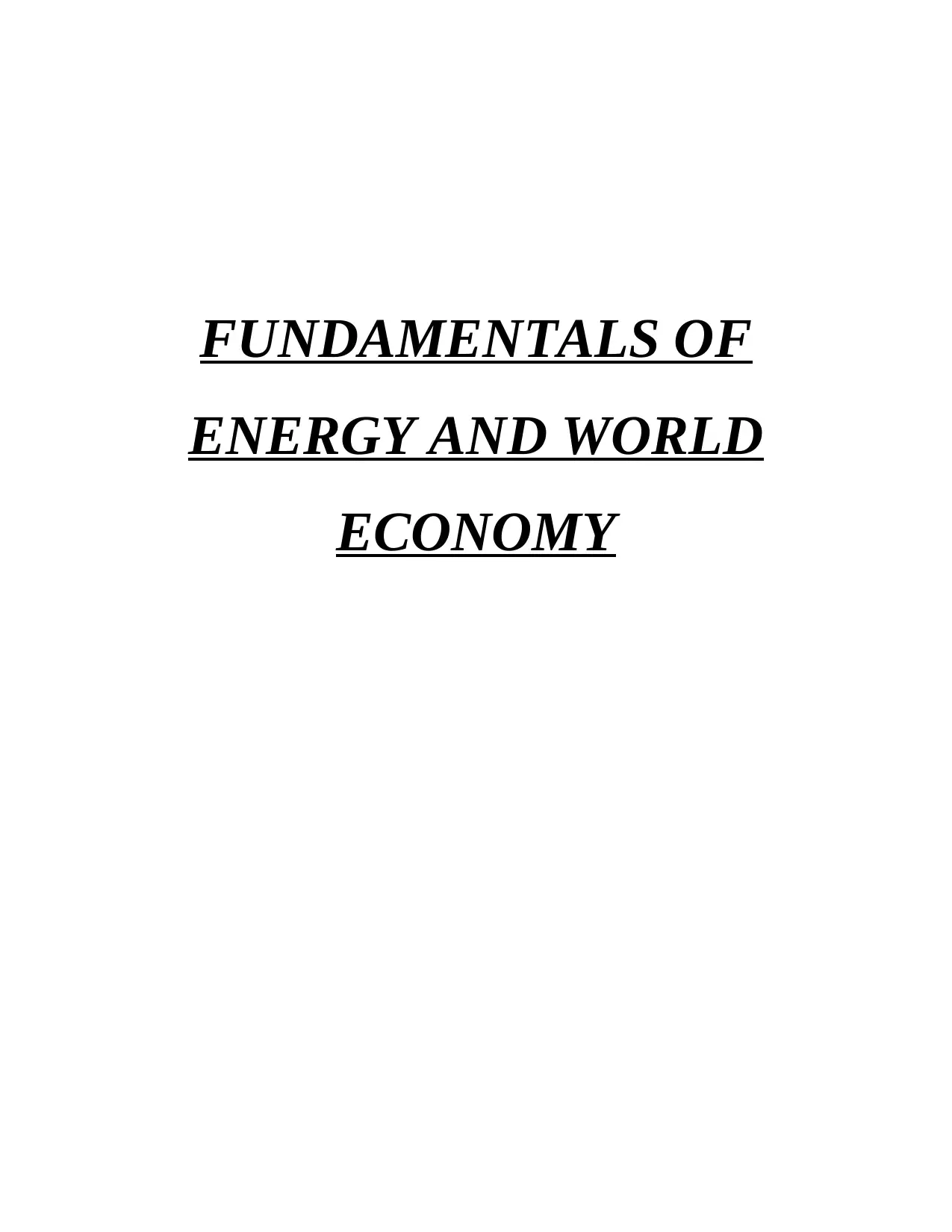
FUNDAMENTALS OF
ENERGY AND WORLD
ECONOMY
ENERGY AND WORLD
ECONOMY
Paraphrase This Document
Need a fresh take? Get an instant paraphrase of this document with our AI Paraphraser
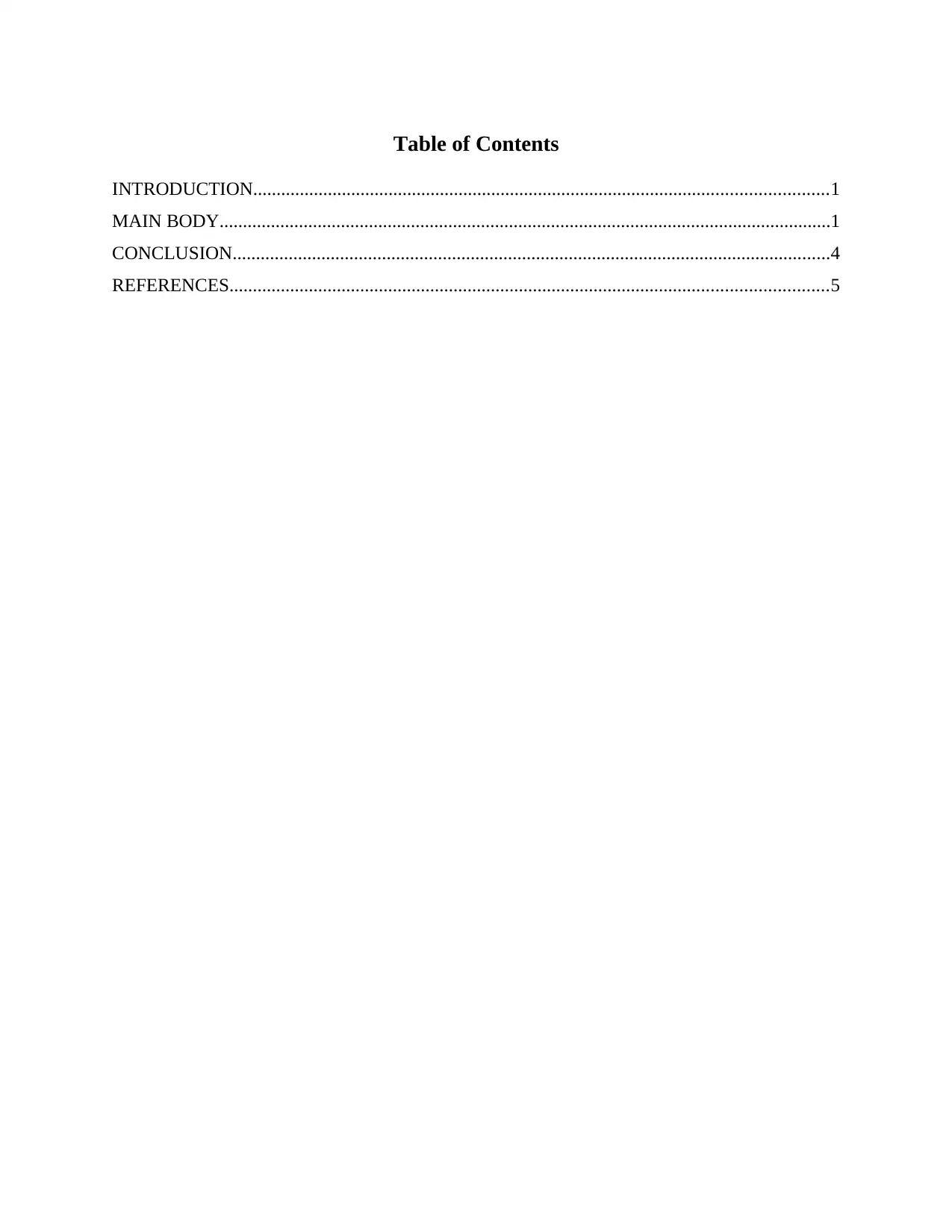
Table of Contents
INTRODUCTION...........................................................................................................................1
MAIN BODY...................................................................................................................................1
CONCLUSION................................................................................................................................4
REFERENCES................................................................................................................................5
INTRODUCTION...........................................................................................................................1
MAIN BODY...................................................................................................................................1
CONCLUSION................................................................................................................................4
REFERENCES................................................................................................................................5
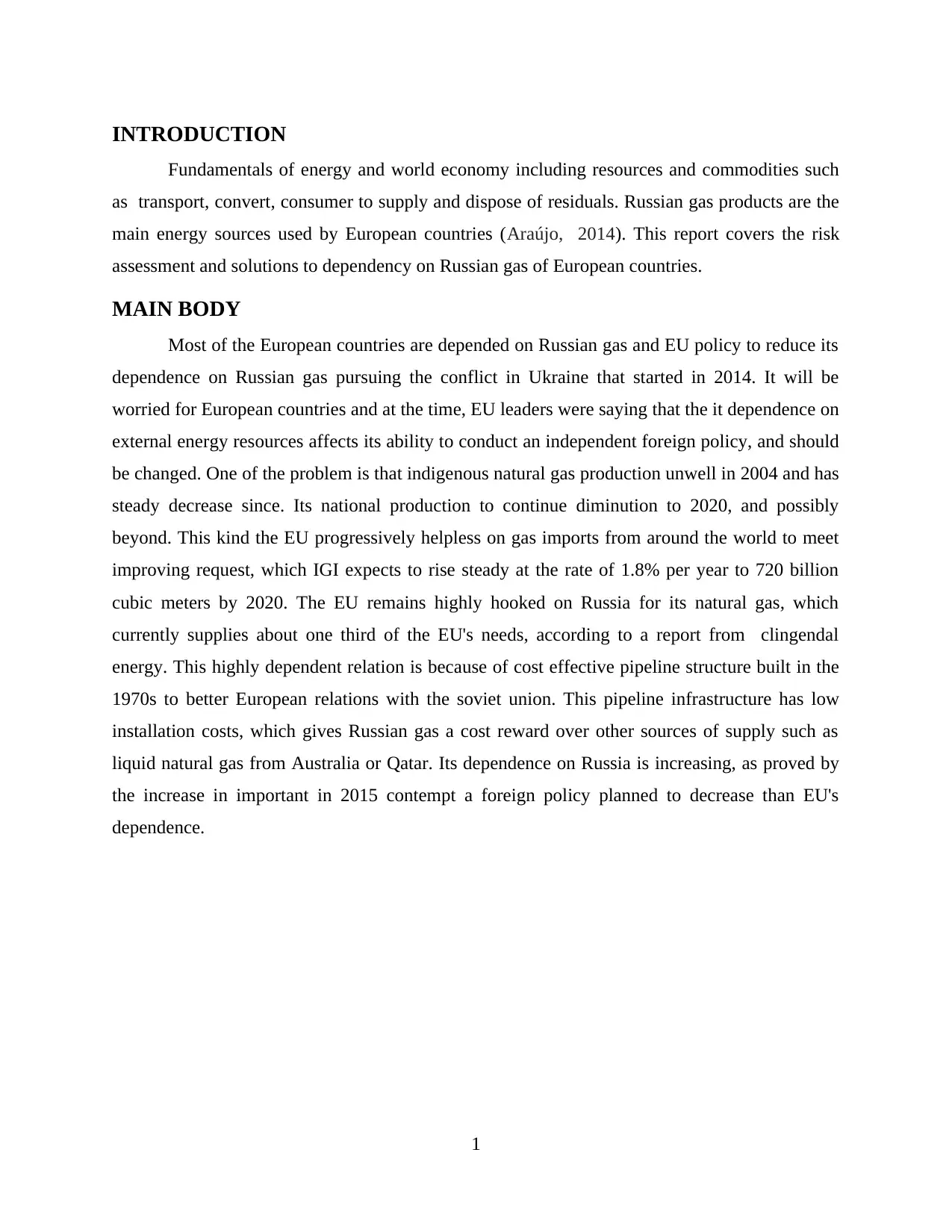
INTRODUCTION
Fundamentals of energy and world economy including resources and commodities such
as transport, convert, consumer to supply and dispose of residuals. Russian gas products are the
main energy sources used by European countries (Araújo, 2014). This report covers the risk
assessment and solutions to dependency on Russian gas of European countries.
MAIN BODY
Most of the European countries are depended on Russian gas and EU policy to reduce its
dependence on Russian gas pursuing the conflict in Ukraine that started in 2014. It will be
worried for European countries and at the time, EU leaders were saying that the it dependence on
external energy resources affects its ability to conduct an independent foreign policy, and should
be changed. One of the problem is that indigenous natural gas production unwell in 2004 and has
steady decrease since. Its national production to continue diminution to 2020, and possibly
beyond. This kind the EU progressively helpless on gas imports from around the world to meet
improving request, which IGI expects to rise steady at the rate of 1.8% per year to 720 billion
cubic meters by 2020. The EU remains highly hooked on Russia for its natural gas, which
currently supplies about one third of the EU's needs, according to a report from clingendal
energy. This highly dependent relation is because of cost effective pipeline structure built in the
1970s to better European relations with the soviet union. This pipeline infrastructure has low
installation costs, which gives Russian gas a cost reward over other sources of supply such as
liquid natural gas from Australia or Qatar. Its dependence on Russia is increasing, as proved by
the increase in important in 2015 contempt a foreign policy planned to decrease than EU's
dependence.
1
Fundamentals of energy and world economy including resources and commodities such
as transport, convert, consumer to supply and dispose of residuals. Russian gas products are the
main energy sources used by European countries (Araújo, 2014). This report covers the risk
assessment and solutions to dependency on Russian gas of European countries.
MAIN BODY
Most of the European countries are depended on Russian gas and EU policy to reduce its
dependence on Russian gas pursuing the conflict in Ukraine that started in 2014. It will be
worried for European countries and at the time, EU leaders were saying that the it dependence on
external energy resources affects its ability to conduct an independent foreign policy, and should
be changed. One of the problem is that indigenous natural gas production unwell in 2004 and has
steady decrease since. Its national production to continue diminution to 2020, and possibly
beyond. This kind the EU progressively helpless on gas imports from around the world to meet
improving request, which IGI expects to rise steady at the rate of 1.8% per year to 720 billion
cubic meters by 2020. The EU remains highly hooked on Russia for its natural gas, which
currently supplies about one third of the EU's needs, according to a report from clingendal
energy. This highly dependent relation is because of cost effective pipeline structure built in the
1970s to better European relations with the soviet union. This pipeline infrastructure has low
installation costs, which gives Russian gas a cost reward over other sources of supply such as
liquid natural gas from Australia or Qatar. Its dependence on Russia is increasing, as proved by
the increase in important in 2015 contempt a foreign policy planned to decrease than EU's
dependence.
1
⊘ This is a preview!⊘
Do you want full access?
Subscribe today to unlock all pages.

Trusted by 1+ million students worldwide
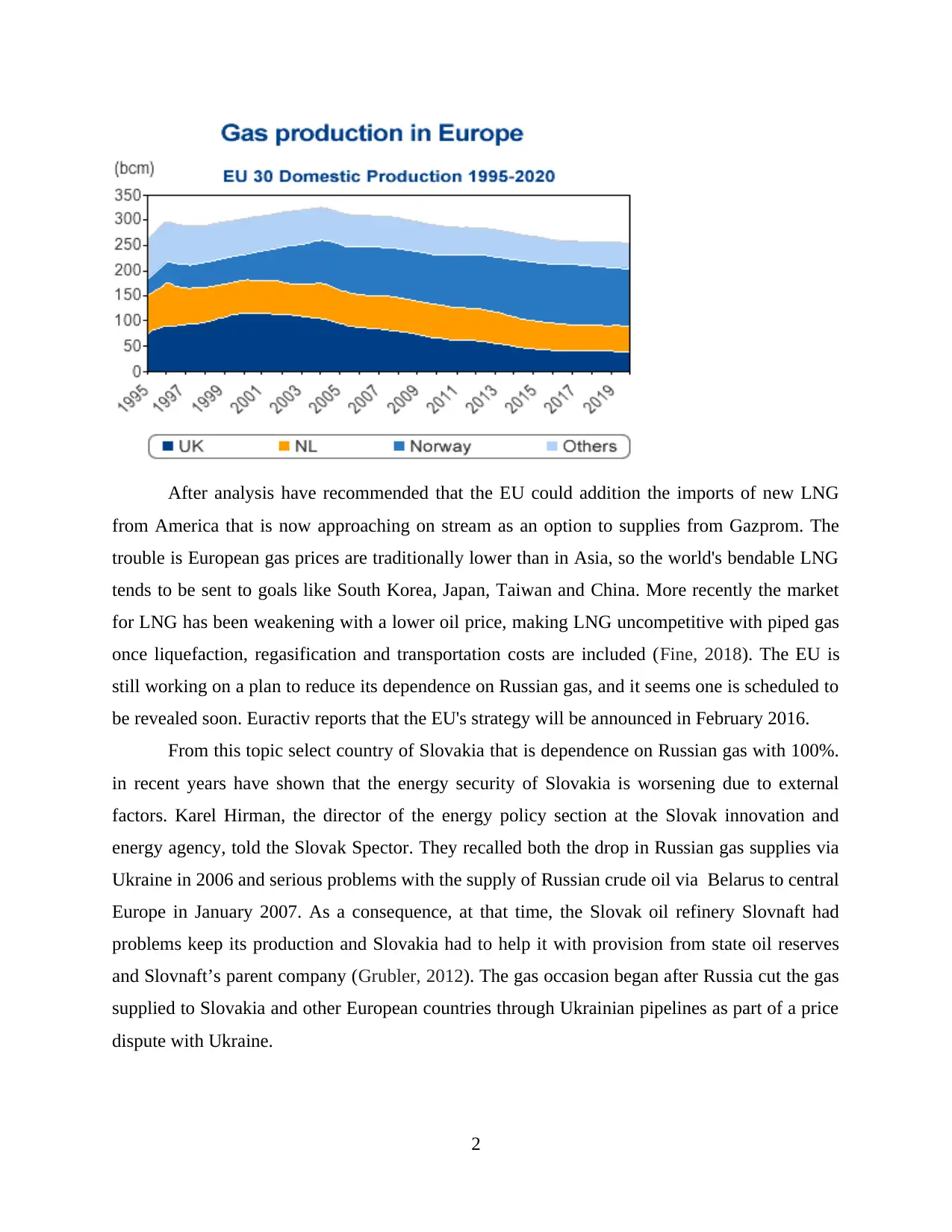
After analysis have recommended that the EU could addition the imports of new LNG
from America that is now approaching on stream as an option to supplies from Gazprom. The
trouble is European gas prices are traditionally lower than in Asia, so the world's bendable LNG
tends to be sent to goals like South Korea, Japan, Taiwan and China. More recently the market
for LNG has been weakening with a lower oil price, making LNG uncompetitive with piped gas
once liquefaction, regasification and transportation costs are included (Fine, 2018). The EU is
still working on a plan to reduce its dependence on Russian gas, and it seems one is scheduled to
be revealed soon. Euractiv reports that the EU's strategy will be announced in February 2016.
From this topic select country of Slovakia that is dependence on Russian gas with 100%.
in recent years have shown that the energy security of Slovakia is worsening due to external
factors. Karel Hirman, the director of the energy policy section at the Slovak innovation and
energy agency, told the Slovak Spector. They recalled both the drop in Russian gas supplies via
Ukraine in 2006 and serious problems with the supply of Russian crude oil via Belarus to central
Europe in January 2007. As a consequence, at that time, the Slovak oil refinery Slovnaft had
problems keep its production and Slovakia had to help it with provision from state oil reserves
and Slovnaft’s parent company (Grubler, 2012). The gas occasion began after Russia cut the gas
supplied to Slovakia and other European countries through Ukrainian pipelines as part of a price
dispute with Ukraine.
2
from America that is now approaching on stream as an option to supplies from Gazprom. The
trouble is European gas prices are traditionally lower than in Asia, so the world's bendable LNG
tends to be sent to goals like South Korea, Japan, Taiwan and China. More recently the market
for LNG has been weakening with a lower oil price, making LNG uncompetitive with piped gas
once liquefaction, regasification and transportation costs are included (Fine, 2018). The EU is
still working on a plan to reduce its dependence on Russian gas, and it seems one is scheduled to
be revealed soon. Euractiv reports that the EU's strategy will be announced in February 2016.
From this topic select country of Slovakia that is dependence on Russian gas with 100%.
in recent years have shown that the energy security of Slovakia is worsening due to external
factors. Karel Hirman, the director of the energy policy section at the Slovak innovation and
energy agency, told the Slovak Spector. They recalled both the drop in Russian gas supplies via
Ukraine in 2006 and serious problems with the supply of Russian crude oil via Belarus to central
Europe in January 2007. As a consequence, at that time, the Slovak oil refinery Slovnaft had
problems keep its production and Slovakia had to help it with provision from state oil reserves
and Slovnaft’s parent company (Grubler, 2012). The gas occasion began after Russia cut the gas
supplied to Slovakia and other European countries through Ukrainian pipelines as part of a price
dispute with Ukraine.
2
Paraphrase This Document
Need a fresh take? Get an instant paraphrase of this document with our AI Paraphraser
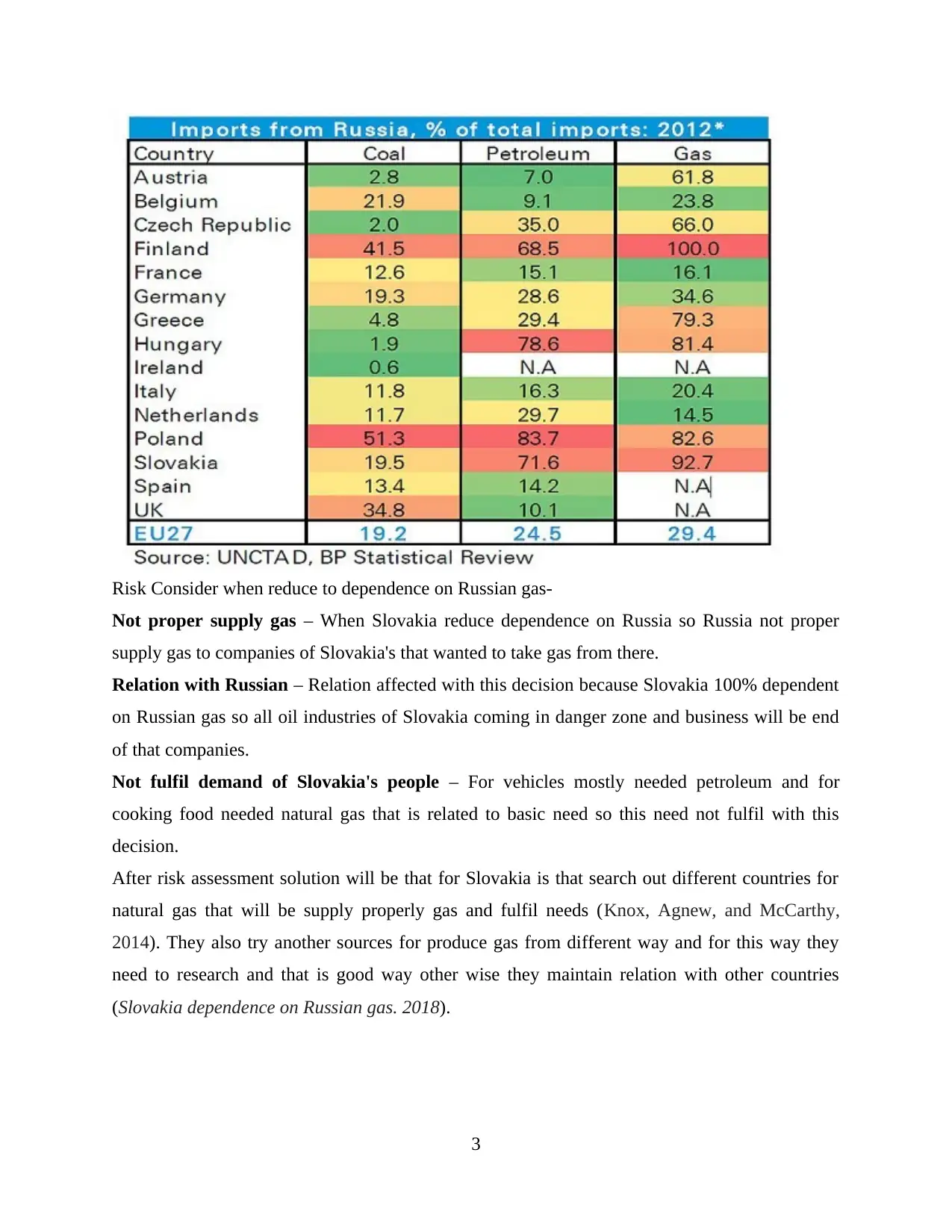
Risk Consider when reduce to dependence on Russian gas-
Not proper supply gas – When Slovakia reduce dependence on Russia so Russia not proper
supply gas to companies of Slovakia's that wanted to take gas from there.
Relation with Russian – Relation affected with this decision because Slovakia 100% dependent
on Russian gas so all oil industries of Slovakia coming in danger zone and business will be end
of that companies.
Not fulfil demand of Slovakia's people – For vehicles mostly needed petroleum and for
cooking food needed natural gas that is related to basic need so this need not fulfil with this
decision.
After risk assessment solution will be that for Slovakia is that search out different countries for
natural gas that will be supply properly gas and fulfil needs (Knox, Agnew, and McCarthy,
2014). They also try another sources for produce gas from different way and for this way they
need to research and that is good way other wise they maintain relation with other countries
(Slovakia dependence on Russian gas. 2018).
3
Not proper supply gas – When Slovakia reduce dependence on Russia so Russia not proper
supply gas to companies of Slovakia's that wanted to take gas from there.
Relation with Russian – Relation affected with this decision because Slovakia 100% dependent
on Russian gas so all oil industries of Slovakia coming in danger zone and business will be end
of that companies.
Not fulfil demand of Slovakia's people – For vehicles mostly needed petroleum and for
cooking food needed natural gas that is related to basic need so this need not fulfil with this
decision.
After risk assessment solution will be that for Slovakia is that search out different countries for
natural gas that will be supply properly gas and fulfil needs (Knox, Agnew, and McCarthy,
2014). They also try another sources for produce gas from different way and for this way they
need to research and that is good way other wise they maintain relation with other countries
(Slovakia dependence on Russian gas. 2018).
3
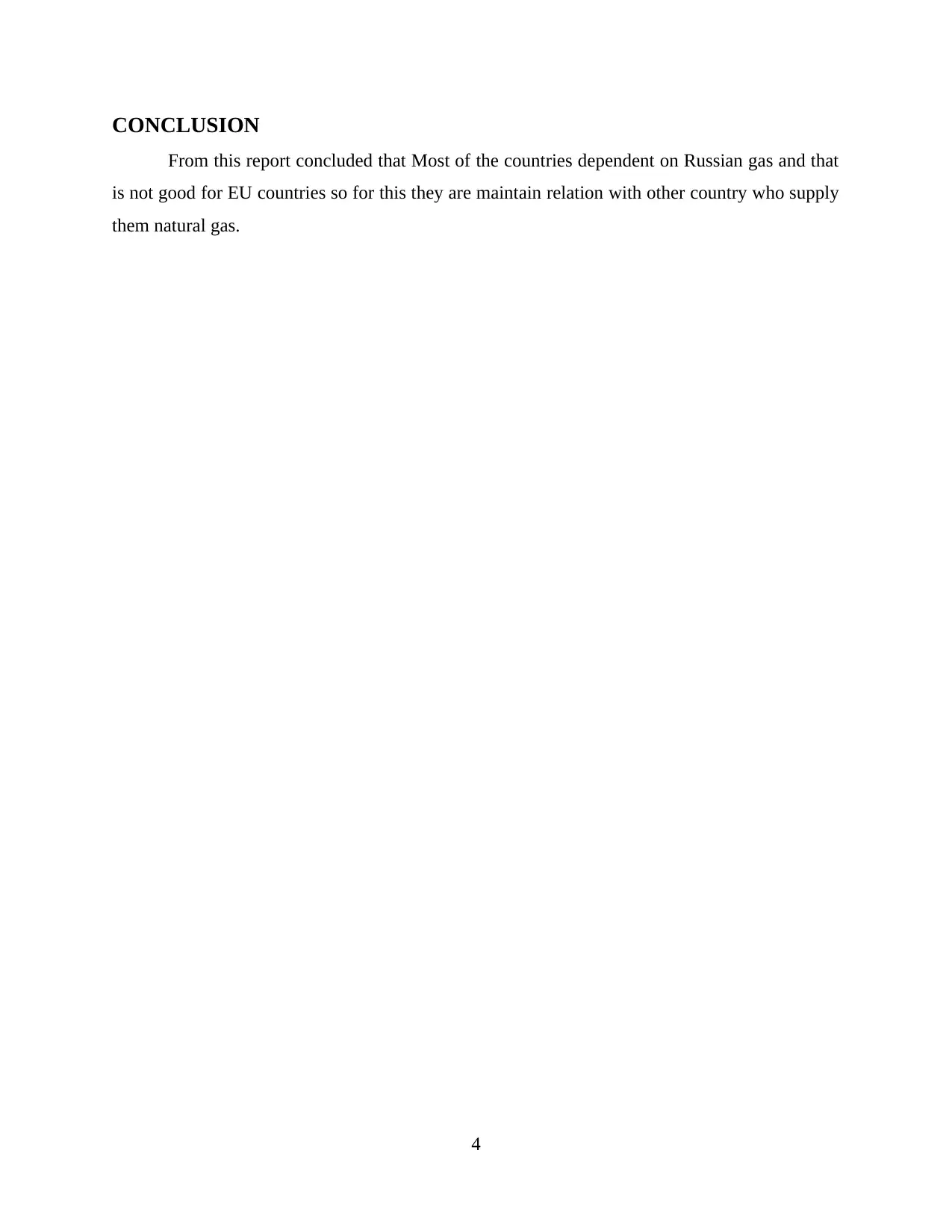
CONCLUSION
From this report concluded that Most of the countries dependent on Russian gas and that
is not good for EU countries so for this they are maintain relation with other country who supply
them natural gas.
4
From this report concluded that Most of the countries dependent on Russian gas and that
is not good for EU countries so for this they are maintain relation with other country who supply
them natural gas.
4
⊘ This is a preview!⊘
Do you want full access?
Subscribe today to unlock all pages.

Trusted by 1+ million students worldwide
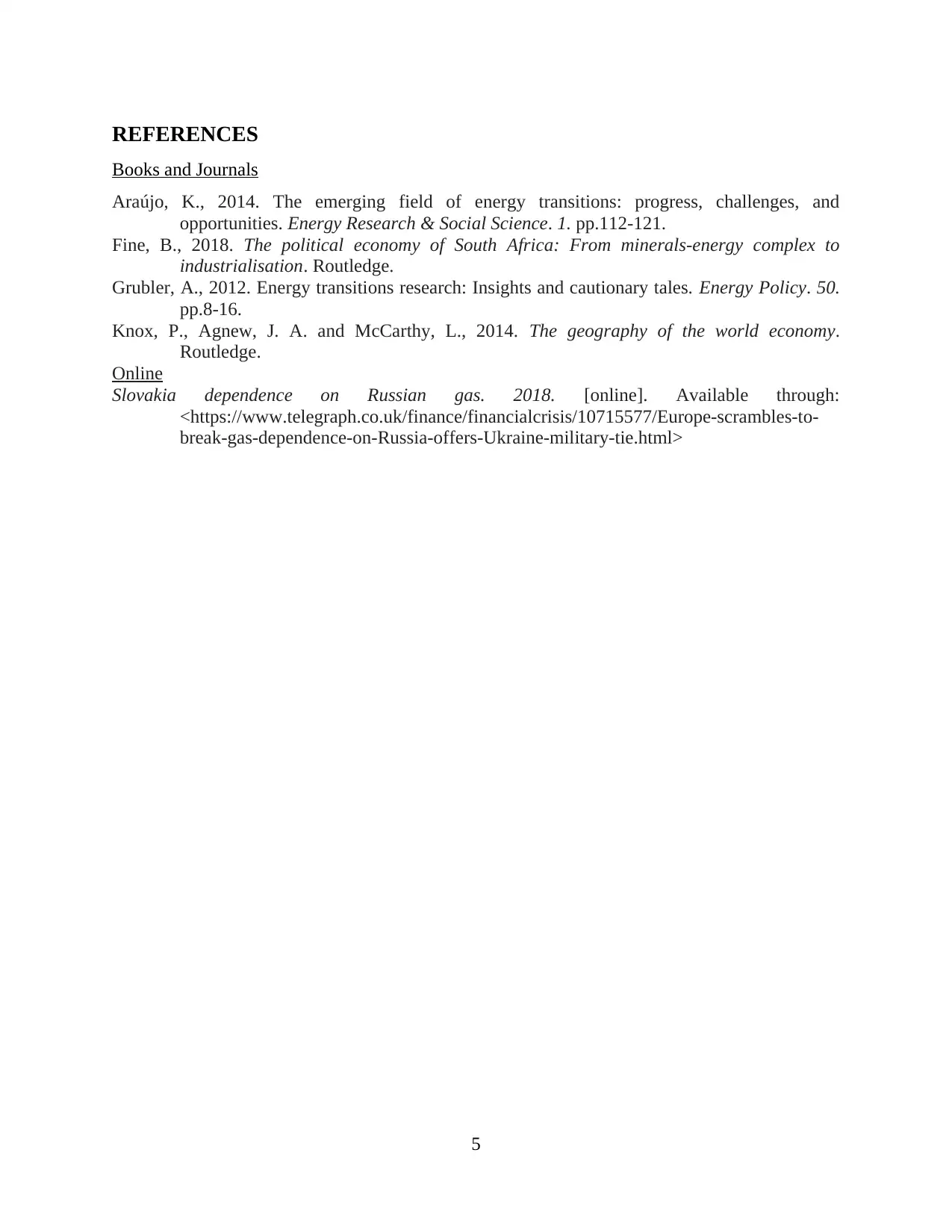
REFERENCES
Books and Journals
Araújo, K., 2014. The emerging field of energy transitions: progress, challenges, and
opportunities. Energy Research & Social Science. 1. pp.112-121.
Fine, B., 2018. The political economy of South Africa: From minerals-energy complex to
industrialisation. Routledge.
Grubler, A., 2012. Energy transitions research: Insights and cautionary tales. Energy Policy. 50.
pp.8-16.
Knox, P., Agnew, J. A. and McCarthy, L., 2014. The geography of the world economy.
Routledge.
Online
Slovakia dependence on Russian gas. 2018. [online]. Available through:
<https://www.telegraph.co.uk/finance/financialcrisis/10715577/Europe-scrambles-to-
break-gas-dependence-on-Russia-offers-Ukraine-military-tie.html>
5
Books and Journals
Araújo, K., 2014. The emerging field of energy transitions: progress, challenges, and
opportunities. Energy Research & Social Science. 1. pp.112-121.
Fine, B., 2018. The political economy of South Africa: From minerals-energy complex to
industrialisation. Routledge.
Grubler, A., 2012. Energy transitions research: Insights and cautionary tales. Energy Policy. 50.
pp.8-16.
Knox, P., Agnew, J. A. and McCarthy, L., 2014. The geography of the world economy.
Routledge.
Online
Slovakia dependence on Russian gas. 2018. [online]. Available through:
<https://www.telegraph.co.uk/finance/financialcrisis/10715577/Europe-scrambles-to-
break-gas-dependence-on-Russia-offers-Ukraine-military-tie.html>
5
1 out of 7
Related Documents
Your All-in-One AI-Powered Toolkit for Academic Success.
+13062052269
info@desklib.com
Available 24*7 on WhatsApp / Email
![[object Object]](/_next/static/media/star-bottom.7253800d.svg)
Unlock your academic potential
Copyright © 2020–2025 A2Z Services. All Rights Reserved. Developed and managed by ZUCOL.





